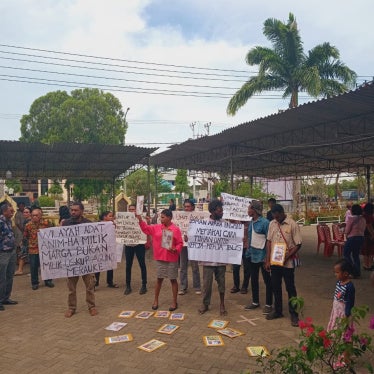Human Rights Watch calls on the Commission on Human Rights to adopt a strong resolution condemning human rights violations by the government of Turkmenistan. The resolution should also request the U.N. High Commissioner for Human Rights to visit the country and call on the Turkmen government to issue invitations to U.N. thematic mechanisms.
Background
The government of Turkmenistan is one of the most repressive in the world. Saparmurat Niazov is president for life. The government tolerates no opposition and crushes critical thinking. Since its independence from the Soviet Union, there has not been a single nationwide election that could be considered free or fair. The Organization for Security and Cooperation in Europe declined to send even a scaled-down mission to monitor the 2000 parliamentary elections in Turkmenistan, so certain was it that they were an empty exercise.
Turkmen opposition figures were either driven into exile in the early 1990s or imprisoned. Most were released, and after the awful prison experience and constant surveillance afterward do not dare speak out again. No independent human rights organizations can operate in Turkmenistan. There is no free media: the government subjects all newspaper outlets to prepublication censorship, has banned most Russian-language media, and has introduced measures to limit access to the Internet.
In the name of building the Turkmen nation, the government has also banned opera, ballet, circus, the philharmonic orchestra, and non-Turkmen cultural associations. It has also closed the Academy of Sciences. Russian orthodoxy and government-approved Sunni Islam are the only religions that may operate houses of worship. Followers of other faiths have faced criminal prosecution, police beatings, deportation, and in some cases demolition of their houses of worship.
The consequences of the November 25 assassination attempt
On November 25, 2002, unknown gunmen opened fire on President Niazov's motorcade, injuring several people. The president was unharmed. Government officials claim that sixty-seven people have been arrested, though many believe the figure to be much higher. Many are relatives of the exiled political opposition. Reliable sources report that some have suffered torture and ill-treatment in custody. Relatives who have not been arrested have been threatened with arrest and subjected to relentless harassment and surveillance. There is little doubt that the intent is to pressure exiles to return, and to compel those in custody to confess or give testimony.
Former foreign minister Boris Shikhmuradov and other former politicians were arrested on December 26, 2002 in relation to the assassination attempt. Their televised "confessions" were no doubt secured under the duress of these threats to their families. Broadcast on national television, their confessions-which were visibly forced-conjured the image of the show trials of the Stalin era. To date fifty-eight people have been sentenced to prison terms ranging from five years to life imprisonment in relation to the assassination attempt, and more await trial. There is reason to fear that they and their families have been subjected to ill treatment as well as intimidation in order to compel confessions and testimony. Throughout the past decade the rule of law has been so thoroughly degraded in Turkmenistan that an effective investigation-ensuring due process rights-and fair trial of the perpetrators of the November 25 assassination attempt are highly unlikely. In the past the Turkmen authorities have tortured dissidents and sentenced them to long prison terms. The judiciary, like all other government agencies, is entirely dependent on the president. The Council of Ministers has the exclusive right to issue arrest warrants.
One of the victims of the post-assassination crackdown is a courageous environmental activist, Farid Tukhbatullin, who has nothing to do with opposition politics. Arrested on December 22, he stands charged of illegally crossing the Uzbek-Turkmen border and of concealing a crime. The latter charge relates to an international conference Tukhbatullin attended on human rights in Turkmenistan, held in Russia, at which authorities wrongly claim that participants discussed Shikhmuradov's intent to violently overthrow the government. Both charges are pretexts intended to intimidate nongovernmental civic activists.
Failure to cooperate with the United Nations
To date, the Turkmen government has not cooperated with the U.N. human rights system, although it has ratified the International Covenant on Civil and Political Rights, the International Covenant on Economic, Social and Cultural Rights, the International Convention on the Elimination of All Forms of Racial Discrimination, the Convention against Torture and other Cruel, Inhuman or Degrading Treatment or Punishment, and other major human rights treaties. It has not filed a single report to U.N. treaty bodies. It has failed to respond to a request made by the High Commissioner for Human Rights for an invitation for a technical assessment mission.
Recommendations
The Commission should adopt a resolution that deplores the abuses perpetrated by the Turkmen government. The resolution should call for the Turkmen government to:
- Express grave concern about serious abuses of human rights in Turkmenistan, and press the Turkmen government to undertake systemic reforms to fully comply with its international human rights obligations.
- Ensure fair and open trials for all those charged in relation to the November 25 assassination attempt, and the guarantee of due process to all those detained; retry those already convicted in full compliance with international standards and release them prior to trial.
- Ensure international monitoring of all trials in order to promote transparency.
- Issue an invitation to the High Commissioner for Human Rights to visit the country. The resolution should call on the High Commissioner and the thematic mechanisms to request invitations to visit Turkmenistan. The High Commissioner should be asked to report on his trip to the 60th session of the Commission. Should the Turkmen government fail to issue an invitation, the High Commissioner should be asked to report to the Commission using information gathered by a UNDP mission and other sources.






